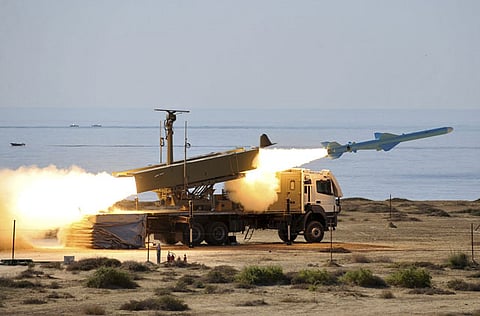Gulf states brace for unwanted US-Iran war
Arab states that lie just miles across the Gulf from Iran are nervously eyeing the prospects of a war between Tehran and the West

Dubai: The Arab states that lie just miles across the Gulf from Iran are nervously eyeing the prospects of a war between Tehran and the West that none of them want and all know could devastate their economies.
This very real fear is prompting the oil-rich states to enhance their defences while hoping that diplomacy can rein in Tehran's regional ambitions and put an end to its worrying nuclear programme.
"No one in the Gulf States wants war but everyone is preparing for the possibility that it might happen," said military analyst Riad Kahwaji.
Tension has escalated as the West continues to squeeze Tehran over its nuclear programme, with the EU threatening a total ban on Iranian oil imports.
Iran has threatened to close the strategic Strait of Hormuz - which links the Gulf to the Arabian Sea and through which 20 percent of the world's sea-transported oil flows - if its petroleum sales are blocked.
The United States, whose navy's Fifth Fleet is based in the Gulf state of Bahrain and which has a military presence in a number of other countries - has told Tehran bluntly that it will not tolerate any such move.
These staunch Washington allies would be sucked into war with Iran if Tehran targets them, said Kahwaji, who runs the Dubai-based Institute for Near East and Gulf Military Analysis (Inegma).
"The clock is ticking, and we in the Gulf do not have control over it," said Kuwaiti political analyst Sami al-Faraj in reference to a potential American or Israeli strike against Iran.
Many times in the past, Iran has warned that it would attack US military facilities in the Gulf Arab states in the event of war.
In addition to the Fifth Fleet, Qatar hosts the US Central Command, there are around 23,000 US troops based in Kuwait and some 2,000 US military personnel in the United Arab Emirates.
The "Mashreq" website, which is close to Iran's Revolutionary Guards, has said targets in the Gulf have already been selected, according to the pan-Arab daily Al Hayat.
Qatari Prime Minister Shaikh Hamad bin Jassem Al Thani, whose country has tried in the past to bridge the gap between Tehran and Gulf nations, said the latter should contribute to resolving the crisis.
"I think all of us have an interest in not having any conflicts in the Gulf," he said recently, saying the Gulf states are "obviously worried" by the rising US-Iranian tension.
"We have experienced military conflicts and we all know that there is no winner in such conflicts, especially for the countries around the Gulf," he said.
In addition to external threats, Gulf states have to deal with the threat of so-called sleeper cells that Iran is suspected of deploying across the region.
"We hear of preventive measures in many countries in dealing with sleeper cells belonging to Iran," Kahwaji said.
The desire to avoid war is accompanied by a wish to curb Iran's increasing regional influence.
"There are two schools now in the Gulf," said Faraj.
"One completely rejects resorting to war unless imposed.
"The second sees the need to counter Iranian interference in Syria, Iraq, Lebanon, Yemen, and Sudan, and its fanning of sectarian tension (in the Gulf), though not necessarily through armed conflict."
The second school "has become stronger" recently, he added.
Faraj told AFP: "It is the Gulf countries that will suffer the most because we are within the range of Iranian rockets," noting, along with Kahwaji that they have strategic oil installations and financial and business centres on their coasts, in close range from Iran's shores.
Saudi Arabia's major oil terminal of Ras Tanura, for instance, is only some 180 kilometres (111 miles) away from Iran's shores. Abu Dhabi, another major Arab oil producer is only 220 kilometres (136 miles) away.
As they wait, Gulf States are stepping up their defence purchases.
Last month, Saudi Arabia signed a deal worth $29.4 billion to buy 84 US F-15 fighter jets, and upgrade 70 other jets.
Shortly afterwards, a $3.48 billion UAE armament deal came to light, including the advanced anti-missile Terminal High Altitude Area Defense System (Thaad).
Earlier in 2011, the United States and Saudi Arabia announced a $1.7 billion deal to strengthen Patriot missile batteries, while Kuwait bought 209 missiles for $900 million.



